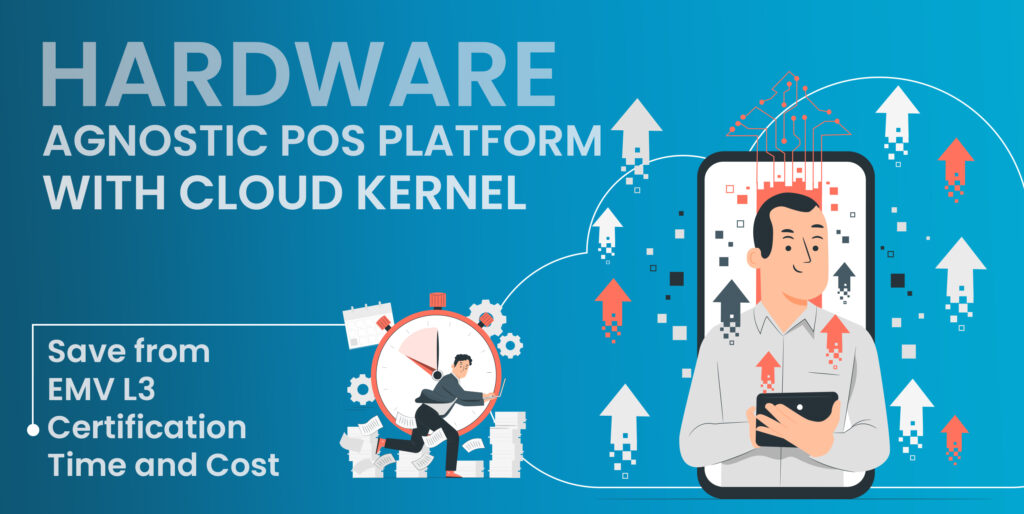Do you know the Fairbit SoftPOS solution can support additional card brands without changing the SoftPOS app on the mobile phone? Do you know you can change contactless CVM limits without pushing these parameters to the mobile phone? Do you know you can integrate different kinds of hardware devices to the same EMV cloud service for unified management of your payment devices? Do you know you can catch EMV frauds much easier?
These are just a few of the advantages of using EMV cloud kernel along with your SoftPOS solution. In this blog, we will compare cloud and embedded kernels to see what opportunities does the EMV cloud kernel offer for SoftPOS.
Embedded vs. cloud kernel
EMV kernel is the heart of a card-present payment transaction. Everything related to payment security, risk management, cardholder verification happens in the kernel.
An embedded kernel is a traditional EMV level 2 kernel application running in the hardware of POS terminal or the Android mobile phone. On the other hand, a cloud kernel is an EMV level 2 kernel running on the cloud.
Until recent years, EMV kernels were all embedded kernels. However, knowing the advantage of cloud technologies, Fairbit developed EMV cloud kernel solution that can be used along with SoftPOS solution or any other hardware-oriented POS solution.
When you use Fairbit cloud kernel along with Fairbit SoftPOS solution, you will get many benefits out of it. Now, let us see what are these benefits :
Adding new EMV kernels without pains of hardware releases
You may want to do the initial launch of SoftPOS with a limited set of brands, say MasterCard and Visa and then you may want to add Amex and Discover sometime later. When you decide to go to the Canadian market, you will need to add Interac. And finally, you may want to add China Union Pay and JCB.
If you are using an embedded kernel, each time you add a new kernel, you should change the SoftPOS app since the app incorporates EMV kernels in it. This new app needs to go through a release process including a lot of internal tests. New EMV kernels should be compiled with the SoftPOS app and the app should be downloaded to all mobile phones on the field.
If you are using Fairbit EMV cloud kernel, it is very easy. The new kernels don’t need to be downloaded to the mobile phone as they run on the cloud. You don’t need to change anything on the mobile phone and on the SoftPOS app. Fairbit simply includes the new kernel on the cloud platform. It is that simple.
Changing EMV parameters without hassles of pushing to devices
From time to time, acquirers need to change EMV terminal parameters. For example, sometimes card brands issue a new certificate authority public key. Card brands issue recommendations for new CVM limits in certain periods. During the covid time, most acquirers have changed CVM limits a few times to enable PINless transactions for higher amount values.
If you are using an embedded kernel, every time there is a change in an EMV parameter, you need to push these parameters to all mobile phones on the field. This process may bring some difficulties along with it. For example, if the mobile phone is turned off, the new parameters don’t go into the terminal and you have to try sometime later.
If you are using Fairbit EMV cloud kernel, you don’t need to push EMV parameters to the mobile phone. All parameters are stored and maintained on the cloud. Whenever you want to have a change on any parameter, you just need to use Fairbit web portal and your change takes effect immediately.
Unified and cross-device payment experience
You can easily integrate new hardware to cloud kernel with a minimum integration and certification effort. Different kinds of devices with different operating systems can use the same EMV cloud kernel service. For example, you may be providing SoftPOS solution for mobile phones and mPOS devices, and you may also provide a POS solution for countertop POS devices. When you use embedded kernels, all these devices should have different EMV level 2 kernel software, because embedded kernels are hardware-oriented kernels. Each kernel comes with its own EMV parameter set. You need to maintain three different kernel platforms.
If you are using Fairbit EMV cloud kernel, all of your devices are integrated to the same Fairbit cloud service, with the same APIs, and with the same EMV parameters. You can use Fairbit EMV parameter management portal to manage the parameters of all different kinds of devices. EMV transactions from all devices will be monitored from the same portal in a unified way.
Real-time access to all of EMV transaction data
When you use an embedded kernel, EMV transaction data remains within the kernel and most of this data is never stored anywhere and they are lost after the transaction. Embedded kernel software gives to POS application EMV transaction data only needed for online authorization. However, there are many more EMV data in a payment transaction. This data is essential to monitor transaction trends, fix bugs, and troubleshoot the issues.
If you are using Fairbit EMV cloud kernel, all EMV data and APDU commands are sent to the cloud and stored in the PCI-DSS certified environment. You can easily get access to transaction details with Fairbit transaction monitoring and reporting web portal. For example, if production transactions are being consistently declined and you don’t understand why, you can simply search the transactions, get access to APDU commands, analyze EMV transaction data, and look into advanced parameters like Fairbit Extended TVR. With all this extensive data, you can perform a granule-level analysis of payment transactions, figure out the transaction issues and provide better services to your merchants.
Keeping up-to-date with new versions of EMV standards
Traditional EMV kernels need to go through the EMV level 2 kernel certification process for each different hardware device. Moreover, these certifications should be repeated for certain periods to keep up-to-date with new versions of EMV specifications. With the cloud kernel, as the certified part of EMV level 2 kernel is on the cloud and as it doesn’t change for each hardware device, the re-certification effort is drastically reduced. The re-certification is needed only for a tiny portion of the EMV kernel residing on the device which manages communication with EMV cards.
Better combatting with EMV frauds
EMV Cloud kernel offers numerous opportunities to combat EMV frauds. As all the chip, terminal, and EMV transaction data is accessible in real-time, this gives a great advantage to detect, monitor, and prevent EMV fraud cases. Some fraud cases are very difficult to catch if you don’t have access to offline and online transaction data. For example, in 2020, David Basin, Ralf Sasse, and Jorge Toro-Pozo from the Department of Computer Science ETH Zurich, Switzerland, identified security issues with some contactless transactions. You can find details in the white paper here. This issue can be identified only if you have access to offline EMV parameters (meaning that these parameters are not going in an online authorization message to the acquirer).
EMV Cloud kernel is a significant step going to a full cloud POS platform
If you are planning to have a cloud POS platform, cloud kernel may be a major step for this. Having the kernel on the cloud will remove the dependencies of your POS application to the hardware platforms.
Conclusion
EMV Cloud kernel with SoftPOS offers great opportunities in terms of improving customer service, better user experience, faster time-to-market and, more diligently combatting frauds. It also provides operational efficiency and cost savings. It simplifies your EMV certification process for additional hardware. It allows you to have a unified and cross-device payment platform. It helps you to get ahead of your competitors and provide the best service to your merchants. You can find more information in these links : https://fairbit.com/emv-kernel-on-the-cloud/ and https://fairbit.com/softpos-solution/







